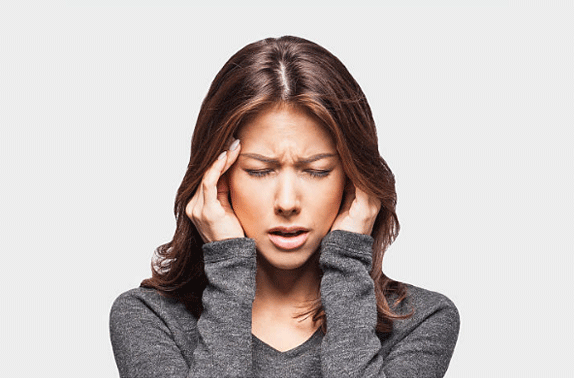Tension headaches are the most common type of headache, affecting millions of people worldwide. Headaches of this type may occur occasionally or even affect some people on a chronic everyday or almost everyday basis. This article provides a comprehensive overview of tension headaches, including their symptoms, causes, medical treatments, and alternative therapies. We will also explore the benefits of chiropractic care, particularly the Zone Technique, which may offer the most effective solution to totally eliminate tension headaches.

Symptoms of Tension Headaches
Tension headaches can manifest with a variety of symptoms:
- Dull, Aching Head Pain: Often described as a tight band around the head. The pain is usually bilateral, affecting both sides of the head.
- Pressure Sensation: A feeling of pressure or tightness across the forehead, sides, or back of the head.
- Tenderness: Tenderness in the scalp, neck, and shoulder muscles. This can be due to muscle tension and sensitivity.
- Mild to Moderate Pain: Unlike migraines, tension headaches typically cause less severe pain that is not aggravated by physical activity.
- Gradual Onset: Pain often starts gradually and can last from 30 minutes to several hours, sometimes persisting for days.
Additional Symptoms
- Fatigue: Feeling tired or sluggish.
- Difficulty Concentrating: Trouble focusing on tasks due to the persistent discomfort.
- Irritability: Increased irritability and mood changes due to the constant pain.
Causes of Tension Headaches
The exact cause of tension headaches is not well understood, but several factors are believed to contribute:
- Muscle Tension: Tension in the neck and scalp muscles due to stress, poor posture, or anxiety.
- Stress: Emotional stress and anxiety are significant triggers.
- Poor Posture: Sitting or standing for long periods with poor posture can strain the neck and shoulder muscles.
- Eyestrain: Prolonged screen time or reading without breaks.
- Fatigue: Physical and mental exhaustion can contribute to the development of tension headaches.
Additional Contributing Factors
- Dehydration: Not drinking enough water can lead to headaches.
- Hunger: Skipping meals or irregular eating habits.
- Sleep Disturbances: Insufficient or poor-quality sleep.
- Environmental Factors: Exposure to bright lights, loud noises, or strong smells.
Medical Treatments for Tension Headaches
Conventional treatments focus on relieving pain and preventing recurrence:
- Over-the-Counter Pain Relievers: Medications like ibuprofen, acetaminophen, or aspirin can help reduce pain.
- Prescription Medications: For chronic tension headaches, doctors may prescribe stronger medications or muscle relaxants.
- Stress Management Techniques: Learning to manage stress through relaxation techniques, such as meditation, yoga, or deep breathing exercises.
- Physical Therapy: Exercises to strengthen the neck and shoulder muscles and improve posture.
- Ice or Heat Therapy: Applying ice packs or heat pads to alleviate muscle tension and pain.
- Cognitive Behavioral Therapy (CBT): A psychological approach to manage stress and anxiety, which can help reduce the frequency of tension headaches.
Advanced Medical Treatments
- Trigger Point Injections: Injecting anesthetics or steroids into trigger points in the muscles to relieve pain.
- Botox Injections: In some cases, Botox can be used to relax muscle contractions and reduce headache frequency.
Alternative and Non-Invasive Treatments
Several alternative therapies can help manage tension headaches:
- Acupuncture: Inserting needles into specific points to alleviate pain and reduce muscle tension.
- Massage Therapy: Therapeutic massage to relieve muscle tension in the neck and shoulders.
- Herbal Remedies: Using herbs such as feverfew, peppermint oil, and ginger.
- Biofeedback: Using electronic devices to monitor physiological functions and learn how to control them to reduce pain.
- Aromatherapy: Using essential oils, such as lavender and eucalyptus, to promote relaxation and alleviate headaches.
Additional Alternative Treatments
- Chiropractic Adjustments: Correcting spinal misalignments to reduce nerve pressure and improve function.
- Hydration and Nutrition: Ensuring adequate water intake and a balanced diet.
- Exercise: Regular physical activity to reduce stress and improve overall health.
- Sleep Hygiene: Establishing a consistent sleep routine and creating a comfortable sleep environment.
Chiropractic Care for Tension Headaches
Chiropractic care offers a holistic approach to managing tension headaches by focusing on the alignment of the musculoskeletal system:
- Spinal Alignment: Correcting misalignments to reduce nerve pressure and improve function.
- Manual Adjustments: Adjustments to relieve stress on the neck and shoulders and promote healing.
- Therapeutic Exercises: Strengthening exercises to support the affected muscles and improve posture.
- Lifestyle Advice: Guidance on ergonomic adjustments and activity modifications to reduce strain.
The Zone Technique: A Specialized Chiropractic Approach
While typical chiropractic care provides significant benefits, the Zone Technique, developed by Dr. Peter Goldman, may offer the best results for eliminating symptoms and addressing the root cause of tension headaches.
What is the Zone Technique?
The Zone Technique is a chiropractic method that focuses on balancing six body systems, known as zones: glandular, eliminative, nervous, digestive, muscular, and circulatory. Imbalances in these zones can lead to various health issues, including tension headaches.
How Does the Zone Technique Work?
- Assessment: The chiropractor assesses the patient’s zones by palpating specific points on the head.
- Zone Balancing: Adjustments are made to specific areas of the spine and body to restore balance to the affected zones.
- Follow-Up: Regular sessions help maintain balance and prevent recurrence.
Why the Zone Technique is Effective
- Holistic Approach: Addresses multiple body systems to treat the root cause of symptoms. This approach ensures that all contributing factors to tension headaches are addressed.
- Personalized Care: Tailored treatments based on individual imbalances. Each session is customized to the patient’s unique needs and condition.
- Comprehensive Healing: Promotes overall health and prevents future issues. By restoring balance to the body’s systems, the Zone Technique supports long-term wellness.
Conclusion
Tension headaches can significantly impact daily activities and quality of life. Understanding their symptoms, causes, and available treatments is essential for effective management. While medical treatments and alternative therapies provide relief, chiropractic care, especially the Zone Technique, offers a comprehensive and holistic solution. By addressing the root causes and promoting overall health, the Zone Technique stands out as a promising option for those suffering from tension headaches.

